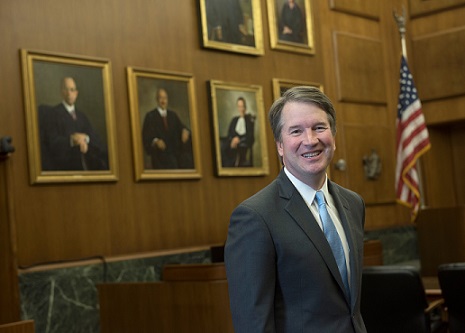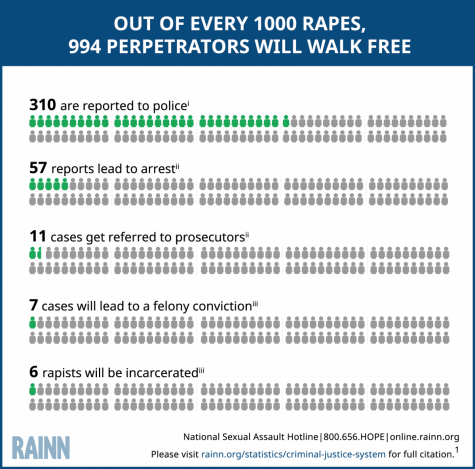Kavanaugh’s sexual assault allegation brings #MeToo’s cultural progress into question

Justice Brett Kavanaugh vociferously denies all allegations of sexual assault and misconduct
September 26, 2018
History doesn’t repeat itself, but unfortunately, it rhymes.
Twenty-seven years removed from Anita Hill testifying before the Senate Judiciary Committee, Christine Blasey Ford has accused Supreme Court nominee Brett Kavanaugh of sexually assaulting her while they were teenagers.
Hill’s 1991 allegations detailing sexual harassment by then-Supreme Court nominee Clarence Thomas elucidated our society’s glaring dysfunctions, hindering equality between genders. It showed us just how far we had to go.
Today, the #MeToo Movement and Women’s March have heralded an empowering new age for women. However, with criticisms and harassment directed at Ford since coming forward, is social progress just a public perception? Are we any closer to ending the patriarchal obstacles impeding equality?
“Our culture has a tendency to trivialize sexual assault. For women coming forward, it’s traumatic and life-destroying,” said College of DuPage Professor of Literature and Gender Elizabeth Kempton.
Kempton believes society is having discourses promoting hearing women, but progress in parts of our culture have stagnated, with facets failing to listen.
“We need to stop the narrative there are so many false accusations ruining men’s lives,” she said. “The statistics show the numbers of false rape allegations are infinitesimal. If we change this narrative, we can start from a place of believing the woman coming forward.”
Since coming forward with accusations of Kavanaugh drunkenly pinning her to a bed while at a 1982 high-school party, forcefully trying to strip her and holding his hand over her mouth to prevent her from screaming, Ford has received death threats and unabated harassment. The onslaught has forced her to move from her home to protect the safety of herself and her family.
College of DuPage Professor of Political Science David Goldberg explained the toxicity of the current political environment.
“It’s become such a polarized and ideologically electric climate. Supporters inspired by the president’s divisiveness view every action as a zero-sum issue,” said Goldberg.
Goldberg explained how during the era of Hill’s testimony, sexual harassment wasn’t a societal priority.
“There was a climate more conducive to traditional gender roles, and society was more willing to tolerate actions that would not be tolerated today. Facilitated in part by high-profile cases, the conversation has evolved and people won’t stand for the same type of behavior. However, the institution of the legislature is still overwhelmingly old males who haven’t evolved as much as society about this,” he said.
Kempton believes social media has provided communities of support for victims and helped to mobilize activism. However, she warned, “For some women, the obstacles of coming forward might be worse in the digital age. It provides a platform to hear victims’ voices that otherwise wouldn’t be heard, but it can also allow widespread momentum to target and harass the victim. It creates a toxic culture enabling dangerous behavior like doxxing, where violent people have access to your private information.”
Ford has agreed to testify before the Senate Judiciary Committee and has demanded Kavanaugh not be in the room when she speaks. The Republican-dominated Committee has refused her request for an FBI investigation like Hill received 27 years ago.
Kavanaugh has unequivocally denied the allegation. President Donald Trump stated support for Kavanaugh and his family.
“I feel so badly for him that he’s going through this,” Trump said in a press conference. “This is not a man that deserves this.”
Kempton explained how anger begins with a fear of power being taken away, inspiring doubt of the accuser to become instinctual.
“The patriarchal narrative begins with this woman coming forward just to damage the man’s life. The more we tell this false narrative, the more power we feed to it. Men and women are fed the same story and it ingrains itself deeply in the psyche,” she said.
After Trump tried to delegitimize Ford for not reporting to authorities sooner, thousands of survivors of sexual assault came forward under #WhyIDidn’tReport to explain their reluctance.
Using the hashtag, Washington Post reporter Abigail Hauslohner tweeted, “I was 17. Raped by a friend. I was confused. In denial. Afraid. He was a good student. (People) liked him. The only friend I told responded (with): “He (would) never do that.” I didn’t think anyone would help me.”
According to a Department of Justice 2016 report, only 23% of rapes and sexual assaults are reported to police.
“The argument some people are making is Ford’s behavior has been consistent with victims of assault,” said Goldberg. “You wait before you come forward, and you are uncomfortable once you do. You’re hesitant about reliving the event under oath, and you’re concerned about the well-being of your family and friends.
“The idea there is some conspiracy is problematic,” continued Goldberg. “Long after this is resolved, her name will forever be associated with this case. (I am) skeptic she would sacrifice her professional and public well-being.”
Survivors face the fear of not being believed or listened to when coming forward. If Ford is not given a fair hearing, there is a fear future women may be intimidated into not coming forward. Just as the social stigma of coming forward has begun to erode, high-profile cases magnify the harassment and procedural abuse victims go through in seeking justice.
“Part of the female population suffers from internalized patriarchal beliefs,” Kempton said. “They believe they somehow deserve these things. They don’t come forward because they bought into the narratives we are trying to change.”
Kempton believes enhanced solidarity and empowerment is necessary to foster an environment where people can come forward without fear of retribution.
She advocates institutional changes to the criminal justice system, including changing the strict statutes of limitations designed to prevent women from coming forward and seeking justice. She also argues for evidence to be expedited, including the thousands of rape-kits with DNA that have never been processed.
“Less than 1% of rapes result in a conviction,” Kempton said. “Institutionally, women don’t want to come forward because they know the small odds of success.
“We need to rethink what we mean by, ‘burden of proof’ in cases of sexual assault,” she added. “Defense attorneys ask questions of women who say they were raped they wouldn’t ask in a case regarding physical assault or murder. Women are scared their lives will be ruined and their cases won’t lead to a conviction,” said Kempton.
She believes since Hill’s testimony 27 years ago, women have garnered the courage to come forward and challenge misogynistic and institutionalized barriers to equality.
“Since Trump was elected, record numbers of women and LGBTQ have run for office. When you are afraid of losing your rights, people become more active,” Kempton said.
The Contentious Vote
Republicans control the Senate by a narrow 51-49 margin. If Democrats remain united, it would only take two Republican defections to sink Kavanaugh’s candidacy.
Goldberg explained if the committee doesn’t vote before the Supreme Court’s next term beginning in October, then the court will remain in a 4-4 balance. Kavanaugh must sit out the entire term.
Goldberg recalled how Hill’s allegations tarnished Thomas’ vote; however, it failed to impede his confirmation.
“How much will (Republicans) feel pressure in advance of midterms?” Goldberg wondered. “How much will the Republican National Committee add pressure on them if they don’t fall in line?”
Nov. 6 congressional midterm elections will decide if Republicans will retain majorities in the House and Senate.
Fueling voter angst is the perception politicians have only been reactionary when it comes to sexual assault or harassment.
Goldberg believes the most powerful pressure the public can apply is through voting.
“The more Sen. Orrin Hatch (R-UT) and Lindsey Graham (R-SC) use outdated language to talk about gender, the worse it hurts them with moderate voters,” he said.
He sees potential repercussions if Kavanaugh is confirmed, however, deems it too difficult to estimate if it’s enough to swing either the House or Senate.
“After Thomas was confirmed, 1992 was labeled the Year of the Woman where a significant number of women were elected for the first time,” stated Goldberg.
He also believes the allegation takes some pressure off at-risk Democratic senators who voted for Trump’s last Supreme Court nominee Neil Gorsuch. It gives them liberty to oppose Trump’s nominee without seeming Anti-Trump and upsetting their socially conservative voters.
However, he sees the continued damage to the credibility of the court as being a larger issue.
“Historically, the Supreme Court and the federal judiciary have always had much higher approval ratings than Congress and the White House,” Goldberg said. “What we’ve seen over the last couple decades is a steady politicization of the court. People who would otherwise see the court as the arbiter of justice might now just see the court with two judges having sexual allegations against them.”
A climate of mistrust and political acrimony has stirred accusations directed at both parties for failing to conduct the proper procedures for justice.
Conservatives have decried Sen. Dianne Feinstein (D-CA) for holding on to information regarding the allegation since Ford contacted her by letter in July.
“Feinstein is rightfully criticized for holding on to the letter,” Goldberg said. “It plays into the Republican narrative, which is this is just an eleventh-hour tactic to stop Kavanaugh from being seated.
“However, Feinstein’s fumbling on this notwithstanding; you still have someone who is going to be seated for a lifetime appointment that will impact the court for 30 years,” he continued. “It’s legitimate to criticize Feinstein, but that doesn’t minimize Ford’s credibility or delegitimize her allegation.”
It remains to be seen if Senate Judiciary Committee Chairman Charles Grassley (R-IA) and the 11 other male Republicans who dominate the committee, will change their refusal to allow an FBI investigation into Ford’s allegation.
“This accusation should be coupled with past misogynist behavior and statements about women made by Kavanaugh,” Kempton said.
Goldberg acknowledged once the doubt is out there, it can’t be removed from public opinion.
“There doesn’t need to be a burden of proof for guilt or innocence; this isn’t a court of law. If there is a significant doubt whether or not the event occurred, then there’s a real problem for the Senate voters.”




















Vandy Manyeh • Sep 28, 2018 at 3:23 pm
Great work, Joey.